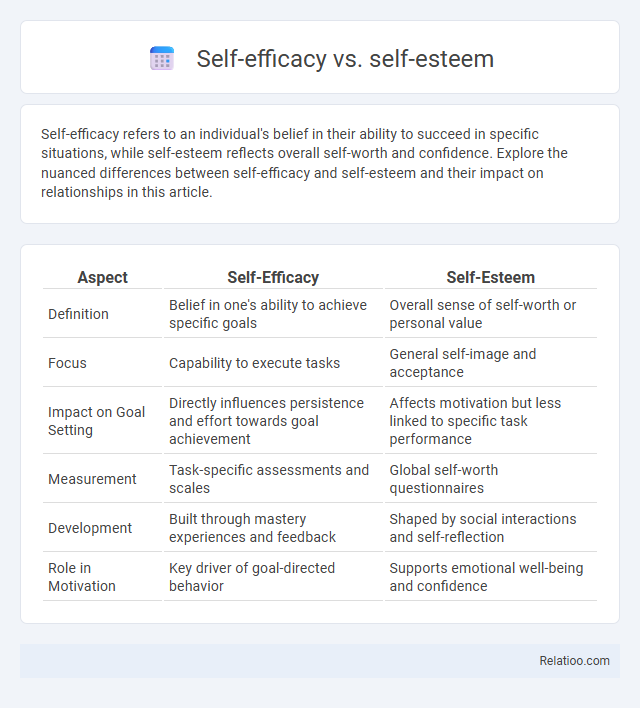Self-efficacy refers to an individual's belief in their ability to succeed in specific situations, while self-esteem reflects overall self-worth and confidence. Explore the nuanced differences between self-efficacy and self-esteem and their impact on relationships in this article.
Table of Comparison
| Aspect | Self-Efficacy | Self-Esteem |
|---|---|---|
| Definition | Belief in one's ability to achieve specific goals | Overall sense of self-worth or personal value |
| Focus | Capability to execute tasks | General self-image and acceptance |
| Impact on Goal Setting | Directly influences persistence and effort towards goal achievement | Affects motivation but less linked to specific task performance |
| Measurement | Task-specific assessments and scales | Global self-worth questionnaires |
| Development | Built through mastery experiences and feedback | Shaped by social interactions and self-reflection |
| Role in Motivation | Key driver of goal-directed behavior | Supports emotional well-being and confidence |
Understanding Self-Efficacy and Self-Esteem
Understanding self-efficacy involves recognizing an individual's belief in their ability to execute specific tasks successfully, which directly impacts motivation and performance. Self-esteem refers to the overall subjective evaluation of one's worth or value, shaping emotional well-being and confidence across various life domains. Differentiating self-efficacy from self-esteem is crucial, as self-efficacy is task-specific, while self-esteem reflects a broader sense of self-worth.
Key Differences Between Self-Efficacy and Self-Esteem
Self-efficacy refers to an individual's belief in their ability to accomplish specific tasks, while self-esteem reflects overall self-worth and personal value. Key differences between self-efficacy and self-esteem include the scope and focus: self-efficacy is task-specific and influences motivation and performance, whereas self-esteem encompasses a broader self-evaluation affecting emotional well-being. Unlike self-esteem, self-efficacy can fluctuate based on experiences and mastery of particular skills, making it a dynamic predictor of behavior and achievement.
The Role of Self-Efficacy in Personal Achievement
Self-efficacy, distinct from self-esteem, directly influences your ability to achieve personal goals by fostering confidence in specific tasks and challenges. High self-efficacy enhances motivation, resilience, and problem-solving skills, leading to improved performance and sustained achievement. Unlike general self-esteem, self-efficacy provides targeted belief in your competence, which is crucial for overcoming obstacles and reaching success.
How Self-Esteem Influences Mental Well-being
Self-esteem significantly influences mental well-being by shaping your emotional resilience and overall self-perception. High self-esteem fosters positive mental health, reducing the likelihood of anxiety and depression, while low self-esteem often correlates with increased vulnerability to stress and negative emotions. Understanding the distinction between self-esteem, self-efficacy, and self-confidence helps tailor strategies to improve your psychological health effectively.
Factors That Shape Self-Efficacy
Factors that shape self-efficacy include mastery experiences, social modeling, social persuasion, and physiological states, which significantly influence your confidence in performing specific tasks. Unlike self-esteem, which pertains to overall self-worth, and self-concept, which involves broader self-knowledge, self-efficacy centers on belief in one's capabilities in particular contexts. Understanding these factors helps tailor strategies to enhance your motivation and resilience in goal achievement.
Building and Maintaining Healthy Self-Esteem
Building and maintaining healthy self-esteem involves cultivating a balanced sense of self-worth that is rooted in realistic self-appraisal and positive experiences. Self-efficacy, the belief in one's ability to accomplish specific tasks, plays a critical role by reinforcing confidence through mastery and competence, thereby enhancing self-esteem. Unlike self-efficacy's focus on capability, self-esteem encompasses broader feelings of self-value and acceptance, both of which are essential for emotional resilience and psychological well-being.
The Impact of Self-Efficacy on Goal Setting
Self-efficacy significantly influences goal setting by enhancing an individual's belief in their ability to achieve specific tasks, leading to more challenging and committed goals. Unlike self-esteem, which reflects overall self-worth, self-efficacy directly affects motivation and persistence in goal-directed behaviors. Studies show that higher self-efficacy improves goal attainment through increased effort, resilience, and strategic planning.
Self-Esteem in Social Interactions and Relationships
Self-esteem plays a crucial role in social interactions and relationships by influencing your confidence and ability to form meaningful connections. High self-esteem fosters positive communication, empathy, and resilience to social challenges, thereby improving relationship quality. Understanding the distinction between self-efficacy (one's belief in their abilities) and self-esteem (overall self-worth) helps in developing stronger interpersonal skills and emotional well-being.
Strategies to Improve Self-Efficacy and Self-Esteem
Building self-efficacy involves setting achievable goals, practicing skills consistently, and seeking constructive feedback to reinforce belief in your capabilities. Enhancing self-esteem requires positive self-talk, recognizing personal strengths, and engaging in activities that foster a sense of accomplishment and self-worth. You can improve both by embracing challenges as opportunities for growth and surrounding yourself with supportive environments that encourage resilience and confidence development.
Self-Efficacy vs. Self-Esteem: Which Matters More?
Self-efficacy, defined as your belief in your ability to succeed in specific tasks, directly impacts motivation and performance more than self-esteem, which reflects your general sense of self-worth. Research shows that high self-efficacy leads to better goal achievement and resilience because it focuses on your confidence in handling challenges. While self-esteem influences overall emotional well-being, cultivating self-efficacy is often more crucial for driving practical success and personal growth.

Infographic: Self-efficacy vs Self-esteem
 relatioo.com
relatioo.com